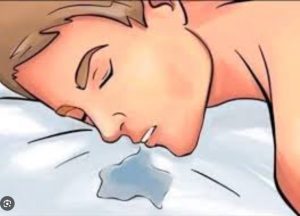Drooling in Dreamland: The Science Behind Sleep Salivation

113,570 views Premiered Sep 6, 2023
Have you ever woken up with a damp pillow and wondered, “Why do I drool in my sleep?” You’re not alone. Many of us have experienced this nighttime phenomenon. In this video, we’ll unravel the mysteries behind sleep drooling and share practical tips on how to prevent it.
Why Do We Drool in Our Sleep?
Drooling during sleep is a common occurrence, and its causes can be multifaceted. Let’s dive into some of the primary reasons:
1. Relaxation of Muscle Tone:
During sleep, our muscle tone decreases, including the muscles that control the mouth and throat. This relaxation can lead to a natural flow of saliva.
2. Sleeping Position:
The position you sleep in can affect drooling. Sleeping on your side or stomach may increase the likelihood of saliva escaping your mouth.
3. Allergies or Congestion:
Nasal congestion due to allergies or illness can force you to breathe through your mouth, contributing to increased saliva production and drooling.
4. Medications:
Certain medications can lead to excessive saliva production, especially if they cause drowsiness.
5. Sleep Disorders:
Conditions like sleep apnea can cause changes in breathing patterns, potentially leading to drooling.
How to Prevent Sleep Drooling
Now that we understand the causes let’s explore some strategies to keep your pillow dry:
1. Sleep Position:
Try sleeping on your back, as this position tends to minimize drooling. You can use a supportive pillow to help maintain this position.
2. Stay Hydrated During the Day:
Oddly, staying well-hydrated while awake can reduce the production of saliva at night.
3. Address Allergies and Congestion:
If allergies or congestion are contributing to mouth breathing, consider using a humidifier or nasal strips to improve airflow.
4. Medication Adjustments:
If you suspect that your medication is causing excessive drooling, consult your healthcare provider for possible alternatives.
5. Treat Underlying Sleep Disorders:
If you suspect you have a sleep disorder like sleep apnea, seek professional evaluation and treatment.
Conclusion:
Drooling during sleep may be a common occurrence, but understanding its causes and implementing simple strategies can help keep your nights more comfortable and your pillows dry. Remember that occasional drooling is typically harmless, but if it becomes a persistent issue or is accompanied by other symptoms, consult a healthcare professional for a thorough evaluation. Sleep tight and stay dry!
